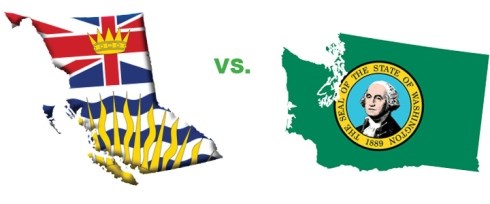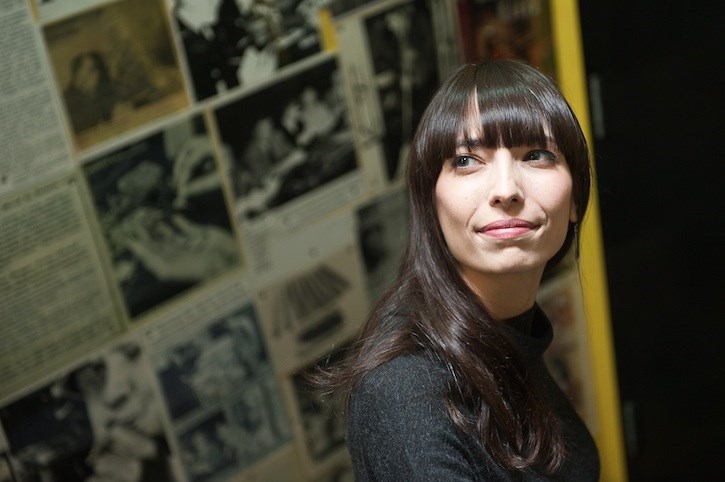A hazy blue cloud hangs over the third floor of the Cannabis Culture Headquarters on the so-called “Pot Block” on West Hastings Street, as dozens of staff and volunteers go about their business.
The office is home to the Cannabis Culture Magazine office, the online Pot TV studio, and the BC Marijuana Party Headquarters. While the yellowed newspaper clippings and psychedelic posters adorning the walls give the office the look, feel, and smell of a campus radio station, this is ground zero for a revolution. Founded by pot activist and entrepreneur Marc Emery in 1994, the Cannabis Culture empire has been at the forefront of the movement to legalize marijuana, for recreational, as well as medicinal uses, for the past 20 years.
It was just across the street at Victory Square where the first 4/20 marijuana rally was held back in 1995.
“We’ve seen a lot of changes since then,” says Marc’s wife, activist and former BC Green Party Candidate for Vancouver-West End Jodie Emery. “Twenty years ago, you couldn’t even buy a bong. We’ve taken enormous strides in that time.”
This Sunday marks the 19th annual 4/20 marijuana rally, which is expected to attract close to 13,000 people to the Vancouver Art Gallery who plan smoke up in unison at 4:20 p.m.
“This is a celebration of cannabis culture and a protest against prohibition,” says Jodie.
While the 4/20 rally got its start in Vancouver, the concept of “4/20” was inspired by a group of high school students in the 1970s in California who would meet up to smoke pot everyday at 4:20 p.m.
The term “4:20” soon became ubiquitous as code for marijuana use among the “Deadhead” culture associated with the rock band The Grateful Dead.
Marc Emery and his supporters took the concept a step further with the inaugural 4/20 rally on April 20, 1995. By having hundreds of people smoke pot in public at the same time, the police would be unable to arrest them all.
“To our knowledge, no one was doing anything on April 20 for 4/20 [before our first rally],” says Jodie.
In the past decade, the event has spread south of the border thanks to the Internet. YouTube videos of the annual Vancouver event have reached a new audience in the US, Jodie notes, resulting in 4/20 events cropping up in recent years.
With extensive renovations planned for the Vancouver Art Gallery, this year’s rally will likely be the last to take place there. Jodie also hopes it will be the last 4/20 rally for which her husband will be absent.
The so-called “Prince of Pot” is currently serving a five-year sentence in a US federal prison in Mississippi for selling marijuana seeds (he’s expected to be released in July with time off for good behaviour). While Marc Emery’s jail sentence has made him a martyr for the marijuana movement, it’s been left to Jodie to step up as the spokesperson and organizer for the cause.
In the past year, the legalization movement has gained considerable momentum thanks in no small part to Marc and Jodie Emery’s ongoing efforts. The US states of Washington and Colorado have legalized the recreational use of marijuana, and a handful of other states are currently considering similar measures.
The public is listening, and part of the reason is because the message is no longer coming from the long-haired hippies, but from the suits.
“We had to partner with the capitalists,” says Jodie. “That’s why Marc is always in his business suit, so people take him seriously.”
Last year, Jodie ran for MLA under the BC Green Party banner in Vancouver-West End in an attempt to bring the issue of drug law reform from the fringes into the mainstream.
Jodie has also shown she is willing to partner with anyone who shares her view that marijuana prohibition does more harm than good, including the man who put her husband in jail.
In 2012, former US attorney and card-carrying Republican John McKay, the man who successfully prosecuted and extradited Marc Emery for selling marijuana seeds, spoke out against the damage wrought by marijuana prohibition.
Jodie Emery was by his side.
“This is what these laws do,” she says. “I don’t blame John for what he did, he didn’t have a choice. But bad laws force good people to do bad things.”
McKay was a sponsor of the bill to legalize marijuana in Washington, which he has stated he believes will reduce crime and increase tax revenue. In Colorado, taxes generated from legal marijuana topped $3.5 million in January, are estimated to generate up to $70 million annually. Washington expects $2 billion in the next five years.
However, while the US has been moving towards legalization, Jodie says she’s disappointed to see Canada going in the opposite direction.
“In the early 2000s, Canada was seen as a place where legalization was possible,” says Jodie.
In 2001, Health Canada allowed access to marijuana for medical purposes. Twice the federal Liberal government tried and failed to pass legislation to decriminalize possession of small amounts for personal use, first in 2002, and then again in 2004.
“Then Stephen Harper got elected and they said they wanted to target the culture of cannabis, and that was scary,” says Jodie. “For us, that meant more than just a crackdown with police, it meant ideas, and music, art, symbolism, tradition, and religion… were being targeted.”
Legal tools like mandatory minimum sentencing and asset forfeiture have targeted marijuana users unfairly, she contends.
“It’s costing taxpayers millions… and it’s tearing families apart,” Jodie Emery says.
Including her own.
“I’m one of the lucky ones,” she says. “I’ve been spoiled with support. But there are so many more families that have suffered, that have kids that have to grow up with a single parent.”
As long as the Conservatives hold power in Parliament, she says Canada won’t be able to move forward with drug law reform.
“Then we will see change, the way it should be.”

British Columbia vs. Washington State
• Pot possession illegal for everyone, unless for medicinal purposes vs. Legal for everyone over age 21.
• Less severe consequences if caught with 30g or less (charged with trafficking if 30g or more) vs. Only allowed one ounce usable marijuana, 16 ounces of marijuana infused product or 72 ounces of marijuana infused liquid product, criminal charges if over limit.
• Cannot produce medicinal marijuana without license vs. Cannot sell or produce without state license.
• Illegal provincially and federally vs. Illegal federally.
• Over $300m spent on prevention in Canada vs. Expected to generate up to $2 billion dollars in tax revenue first five years.



